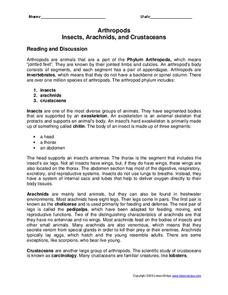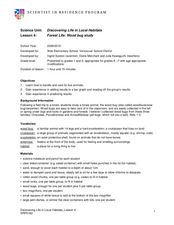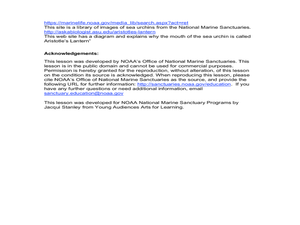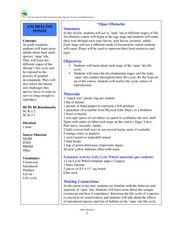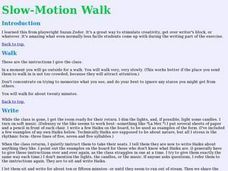crustacens Teacher Resources
Find crustacens lesson plans and worksheets
Showing 229 resources
Lesson Planet Curated

Crash Course: Biology
Imagine an entire biology course in one collection of 40 videos! Based on the AP Biology curriculum, viewers learn about the things that make up living things and the processes that keep organisms alive. They also learn how to identify...
Curated OER
Crustacean Critters
Students explore the habitats of hermit crabs. In this crustacean lesson plan, students discover what animals need to survive. Working with live hermit crabs, students explore how hermit crabs have adapted to their habitats.
Curated OER
The Eyes Have It!
Reading essays about deep-sea expeditions open this lesson on crustacean vision. Marine biology explorers study the compound eye and then complete a worksheet in response to all they have discovered. Although the lesson doesn't offer an...
Deep Look
Roly Polies Came From the Sea to Conquer the Earth
Roly polies or pill bugs? No matter what you call them, these organisms are unique. Biology scholars discover a true evolutionary success story in a video about tiny, land-dwelling crustaceans. The narrator describes their journey from...
Curated OER
Arthropod Coloring
In this arthropod worksheet, students compare and contrast the different animals found in the Phylum Arthropoda: insects, arachnids, and crustaceans. Students complete 8 fill in the blank statements and color illustrations.
Curated OER
Common Shells and Crustaceans
In this science worksheet, students locate the names of 15 common shells and crustaceans. Students locate the words in a word search puzzle. All the words in the word bank have a detailed colored illustration.
Curated OER
Arthropods, Insects, Arachnids, and Crustaceans
In this biology worksheet, students read about arthropods and some of the different species that fit into this classification. They then answer 13 questions about what they just learned. The answers are on the last page of the packet.
Curated OER
Crustacean Dot To Dot
In this science worksheet, 2nd graders will complete a dot to dot. Students will connect the dots from one to ninety-two to create a common crustacean.
Curated OER
Forest Life- Wood Bug Study
Examine wood bugs and their habitat. Learners gather wood bugs and examine their bodies. Then discuss their body parts and how they help them survive. They also predict where they think wood bugs live to then graph the class results.
Curated OER
Pill Bug Extravaganza
Tenth graders watch a PowerPoint presentation to review the scientific process. They examine pill bugs before designing an experiment to find new discoveries about these Crustaceans. They complete ten lessons in this unit.
Curated OER
Fish Parasite Survey
Young scholars count nematodes, cestodes and crustaceans on approximately one-hundred and fifty fish. They fill out autopsy reports for external and internal parasites then complete and discuss guide questions to make inferences about...
Curated OER
Through Other Eyes
High schoolers describe the structures of crustaceans and the features that give organisms capabilities that exceed those of humans. For this investigative lesson students replicate some of the features of photo-receptors in a...
Curated OER
Crustaceans
In this science activity, students find the words that are related to the subject of crustaceans and the answers are found at the bottom of the page.
Curated OER
A'ama and Pipipi Adaptations
Students explore ocean creatures. In this crustacean lesson plan, students determine how Black Nerite snails and Sally Light-foot crabs have adapted to their ocean habitats. Students complete diagrams and hypothesize about the necessity...
Curated OER
Arthropod Rhymes
In this arthropods worksheet, high schoolers read rhymes about arthropods and use the science terms they have learned to answer the question following the rhyme. This worksheet has 12 fill in the blank questions.
Curated OER
Homes for Hermit Crabs
Students discover the differences between hermit crabs and mollusks and identify their parts. After reading a story about hermit crabs, they complete an anatomy worksheet. For another activity, students fold and cut a diagram of a hermit...
Curated OER
Sea Urchins - Diadema Antillarum
Students investigate oceanography by painting sea life. In this crustacean lesson, students identify sea urchins in our ocean environments and describe the functionality of their spherical-shaped bodies. Students design their own sea...
Curated OER
Egg Carton Lobsters
Who doesn't love learning about the ocean? And who wouldn't want to help create an ocean themed mural? Little learners make lobsters out of recycled egg cartons, pipe cleaners, and paint. These are then used as part of a larger 3-D ocean...
Ricochet Science
Carbohydrates
Do you know what table sugar and the exoskeleton of crustaceans have in common? They are both types of carbohydrates. The video explains the three types of carbohydrates: monosaccharides, disaccharides, and polysaccharides. It gives...
Curated OER
Opae Obstacles
Students explore the life cycle of shrimp. In this life cycle lesson, students research the different stages of a shrimp's life cycle. Students examine threats to the species in each stage of life.
Curated OER
Ocean Exploration
Students explore a simulated ocean floor. In this environmental lesson plan, students take on roles of an ocean dive team exploring the ocean floor. Dive logs will be created and the students will explore their sections of simulated...
Curated OER
Oceanography: Ocean Market
Slearners identify consumer goods obtained from the oceans. They classify the items and calculate the cost of buying these goods. After taking a simulated sea shopping spree, they tally the cost of the items purchased. They conclude the...
Curated OER
Building a Pill Bug Palace
Pupils make "pets" of isopods (potato bugs) to determine their preferred environment and food sources. They record their results on a bar graph and in a scientific report.
McGraw Hill
Arthropods
Are spiders related to crabs? Study the order of arthropods with a reading selection about animal diversity. It provides details about each class within the order, as well as vivid pictures and explanatory charts.








